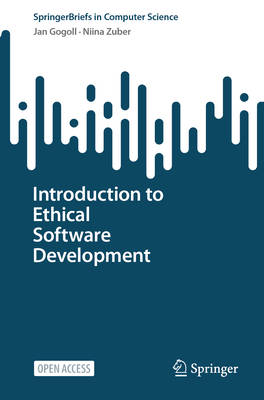
Bedankt voor het vertrouwen het afgelopen jaar! Om jou te bedanken bieden we GRATIS verzending (in België) aan op alles gedurende de hele maand januari.
- Afhalen na 1 uur in een winkel met voorraad
- In januari gratis thuislevering in België
- Ruim aanbod met 7 miljoen producten
Bedankt voor het vertrouwen het afgelopen jaar! Om jou te bedanken bieden we GRATIS verzending (in België) aan op alles gedurende de hele maand januari.
- Afhalen na 1 uur in een winkel met voorraad
- In januari gratis thuislevering in België
- Ruim aanbod met 7 miljoen producten
Zoeken
Omschrijving
This open access book bridges the gap between ethical theory and software practice. It introduces foundational concepts in digital ethics, highlights the distinctive nature of software as a technology, and offers a systematic approach to integrating ethics into the development process. The book is structured in eight chapters: it starts with an Introduction presenting a historical overview that puts the relation between ethics and technology (with software as a special kind of technology) in context. Next, What is (Digital) Technology? explores various philosophical perspectives on technology and underlines why software producers carry a significant ethical responsibility. Why develop Software ethically? then explores the ethical imperative for software development and advocates for a dynamic hybrid approach that combines universal ethical principles with context-sensitive, participatory methods, while What is Ethics? introduces the foundational concepts of ethics and explores their relevance for software development. Subsequently, Values and Software explores the central role of values in ethical software development discussions. Spotting the Right - Overcoming Moral Uncertainty then addresses the foundational phase of ethical practice and examines the epistemic challenge of identifying morally significant aspects in software design, and Deciding for the Good - Overcoming Moral Indecisiveness examines the challenges of ethical decision-making in software development and highlights the necessity of ethical deliberation to navigate value conflicts such as usability versus explainability, and safety versus autonomy. Eventually, Organization, People and Processes underlines the crucial role organizational structures play in enabling ethical deliberation within software development. The book offers practitioners a clear orientation in the increasingly bewildering landscape of normative demands, value lists, ethical guidelines, and codes of conduct that have emerged around ethically informed software development. It especially aims at practitioners, product managers, policymakers, and students who wish to understand the ethical dimensions of the software systems they develop or regulate.
Specificaties
Betrokkenen
- Auteur(s):
- Uitgeverij:
Inhoud
- Aantal bladzijden:
- 134
- Taal:
- Engels
- Reeks:
Eigenschappen
- Productcode (EAN):
- 9783032061942
- Verschijningsdatum:
- 7/11/2025
- Uitvoering:
- Paperback
- Formaat:
- Trade paperback (VS)
- Afmetingen:
- 156 mm x 234 mm
- Gewicht:
- 217 g

Alleen bij Standaard Boekhandel
+ 115 punten op je klantenkaart van Standaard Boekhandel
Beoordelingen
We publiceren alleen reviews die voldoen aan de voorwaarden voor reviews. Bekijk onze voorwaarden voor reviews.









